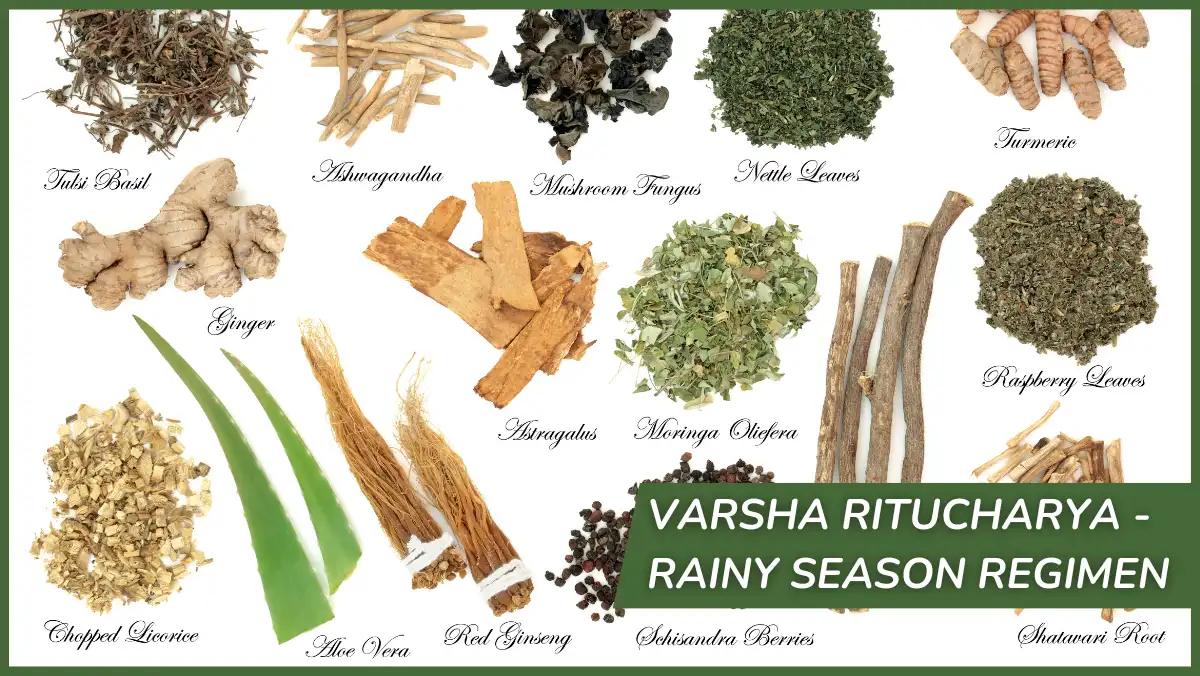VARSHA RITUCHARYA: Ayurvedic Diet and Regimen for the Rainy Season
Introduction:
During the rainy season, digestion-related issues arise due to the low digestive fire, including reduced hunger, bloating, fullness, and loose stools. To maintain a healthy balance, it’s essential to make conscious dietary choices that support digestion. Let’s explore the diet guidelines for the rainy season to optimize our well-being.
Diet Recommendations:
Include Wheat Roti with Cow Ghee
During the rainy season, it is advisable to opt for wheat roti in the form of phulka, accompanied by a generous amount of cow ghee. This combination provides warmth, nourishment, and aids in digestion. However, it is best to avoid heavy and oily options like paratha and poori.
Incorporate Millet Roti
Millets such as ragi, bajra, and jowar can be included in your diet during the rainy season. These grains should be consumed in moderation and preferably with ghee or oil to enhance their nutritional value and aid in digestion.
Oils
Sesame seed oil (Tila taila), mustard oil, and coconut oil are excellent choices for cooking during the rainy season. These oils possess warming properties and help counteract the dampness prevalent during this time.
Dal
Moong dal and toor dal are ideal options for the rainy season. Light and easily digestible, these dal preparations provide nourishment without overwhelming the digestive system.
Method of Preparation:
- Soak the dal overnight to soften it and improve its digestibility.
- Cook the dal until it is soft and easily mushable.
- In a separate pan, heat ghee or oil.
- Add hing, jeera, and curry leaves to the hot ghee or oil.
- Pour the seasoned mixture over the cooked dal and mix well.
Rice
Ayurveda suggests a unique method of cooking rice during the rainy season. Instead of using a lid, cook the rice in an open vessel.
Method of Preparation:
- Measure the desired quantity of rice and rinse it thoroughly.
- In a pot or vessel, add three parts of water for every part of rice. (Ratio of 1:3)
- Place the vessel on the stove and cook the rice without covering it with a lid.
- Allow the rice to cook until it becomes soft and fully cooked.
- Once cooked, drain the excess water from the rice.
This method improves digestion and prevents the rice from becoming heavy on the stomach.
Vegetables
Opt for vegetables such as bottle gourd, snake gourd, pumpkin, and ridge gourd during the rainy season. These vegetables are light, easy to digest, and help maintain the body’s balance during this time. However, it is advisable to avoid green leafy vegetables as they can be heavy to digest.
If you prefer to consume greens vegetables, boil them in water, drain, and then saute them in ghee or oil.
Papad
Instead of indulging in deep-fried papads, opt for baked moong dal papads. Baking them reduces the oil content while still providing a crunchy and enjoyable accompaniment to your meals.
Chutney
Prepare chutneys using ingredients that are suitable for the rainy season.
- Tila chutney, made with sesame seeds, jaggery, and saindhava lavana, offers a delightful blend of flavors.
- Garlic chutney, consisting of garlic, jeera, and saindhava lavana, adds a tangy and pungent taste to your meals.
- Pudina chutney, made with mint leaves, lemon juice, garlic, ginger, chilli, and saindhava lavana, offers a refreshing and cooling effect.
Achar/Pickle
Nimbu achar (lemon pickle) and amla achar (amla pickle) are excellent choices to enhance the taste of your meals during the rainy season.
These pickles, prepared with hing, methi, ginger, saindhava lavana, mustard, turmeric, and methi powder, offer a burst of tanginess and provide numerous health benefits.
Milk
During the rainy season, incorporating warm milk into your routine can provide comfort and aid digestion. Add 1-2 pinches of dry ginger powder to a cup of hot milk and stir well. This simple addition helps to balance the digestive fire and enhances the overall benefits of milk.
Diet to Improve Digestion:
To improve digestion and support overall digestive health during the rainy season, consider the following recipes:
- Ginger and Saindhava Lavana: Prepare a mixture of ginger and saindhava lavana (rock salt). Consume a small quantity of this mixture half an hour before your meals. However, individuals with gastritis or a burning sensation in the chest should avoid this remedy.
- Dry Ginger Powder, Jaggery/Ghee, and Jeera Powder: Individuals with increased pitta, gastritis, decreased appetite, or improper digestion can benefit from this recipe. Mix dry ginger powder, jaggery or ghee, and jeera powder together. Consume a small quantity of this mixture half an hour before meals to improve digestion.
- Haritaki Choorna and Saindhava Lavana: If you experience constipation or distension of the abdomen, consuming 1-2 grams of haritaki choorna (powder) with saindhava lavana and lukewarm water can provide relief and aid in regular bowel movements.
Takra Prayoga (Buttermilk):
Buttermilk is an excellent beverage to include in your diet during the rainy season. Its cooling properties help balance excess heat and maintain digestive health.
Method of Preparation:
- Take fresh buttermilk in a container.
- Heat the buttermilk on low flame until bubbles start to appear.
- Add turmeric, jeera, curry leaves, and a pinch of hing to the buttermilk.
- Stir well to incorporate the flavors.
Water Consumption
Water plays a crucial role in maintaining hydration and supporting digestion. During the rainy season, it is advisable to boil water and allow it to cool before consuming. To enhance the water’s digestive properties, add spices like saunf (somph), jeera, pepper, dalchini (cinnamon), lavanga (cloves), or dhaniya (coriander) while boiling.
Method of Preparation:
- Boil 1 liter of water in a pot.
- Add 1 to 1 1/2 teaspoons of your preferred spice powder to the boiling water.
- Allow the water to simmer until it reduces to half the quantity.
- Strain the water to remove any residue.
- The infused water is now ready to be consumed.
Foods to Avoid:
To maintain optimal health during the rainy season, it is recommended to avoid certain foods that can disrupt digestion and lead to imbalances. These include:
- Apple, Grapes, and Banana: These fruits are best consumed during other seasons as they can aggravate the digestive system and contribute to digestive discomfort during the rainy season.
- Buffalo Milk: Opt for cow’s milk instead of buffalo milk, as the latter may be heavy to digest and lead to digestive issues.
- Fried and Refrigerated Foods: Avoid fried and refrigerated foods as they can be heavy on the stomach and cause sluggish digestion.
- Sabudana Kichidi: Although sabudana (sago) is popularly consumed during the monsoon, it can be heavy and difficult to digest. It is best to consume it in moderation or replace it with lighter alternatives.
Avoid intake of food when you have these symptoms:
- Adhyashana (Eating Without Hunger): Avoid consuming food when you don’t have a natural appetite. Eating without hunger can disrupt digestion and lead to various issues. Listen to your body’s signals and eat only when you feel genuinely hungry.
- Ajeernashana (Eating with Digestive Issues): If you are experiencing loose stools or indigestion, it’s best to avoid eating until your symptoms subside. Consuming food during these times can further aggravate the digestive system and prolong the discomfort. Give your body some time to heal before resuming regular meals.
- Incomplete Digestion: If you have previously eaten a meal that hasn’t been properly digested yet, it is advisable to wait until the previous meal is fully processed before eating again. Starting a new meal before the previous one is digested can overload the digestive system and lead to digestive disturbances.
Conclusion:
Varsha Ritucharya offers valuable guidelines for maintaining health and well-being during the rainy season. By following these dietary recommendations, incorporating the suggested preparations, and avoiding foods that may disrupt digestion, you can support your body’s balance and enjoy the monsoon season to the fullest.
Remember to choose fresh, home-cooked meals that are easy to digest and consume them in a timely manner. Embrace the warmth and nourishment that Ayurvedic practices provide, and let the rain rejuvenate you inside and out.


